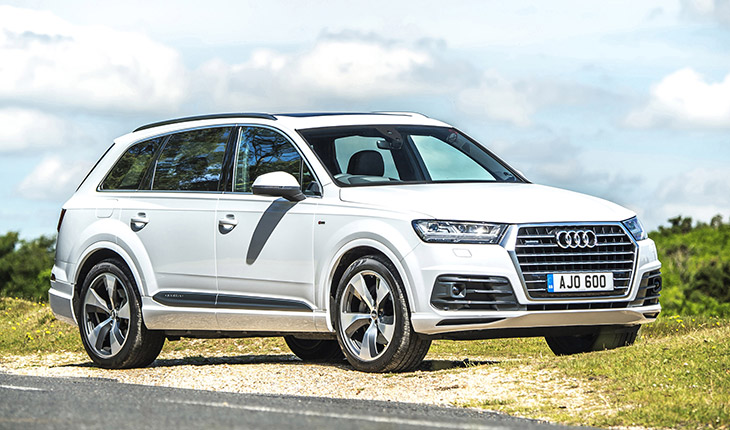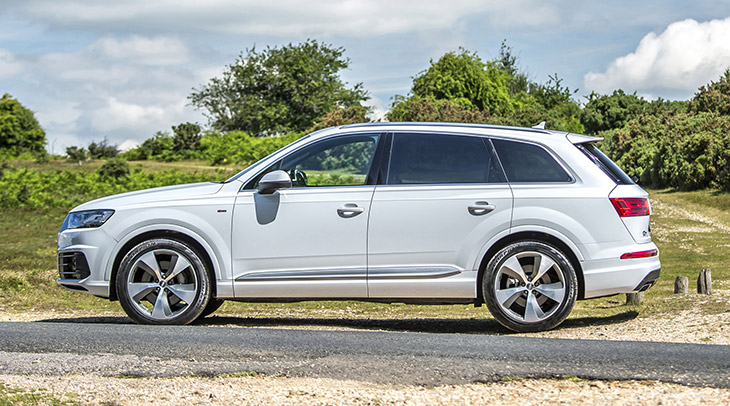 By jettisoning up to 325kg in weight compared with its predecessor the all-new Audi Q7 is perfectly placed to capitalise on the fuel-saving capabilities of advanced new engines like the 218PS V6 TDI, which has just joined the range. Complementing the 272PS version of this remarkably efficient and refined 3.0-litre unit, which spearheaded the launch of the re-engineered seven-seat luxury SUV, the new lower output option is capable of returning in excess of 49mpg with CO2 emissions of as little as 148g/km. The new Audi Q7 3.0 TDI quattro 218PS is available in SE and S line specification priced from £47,755 OTR, and is due with its first UK customers in October.
By jettisoning up to 325kg in weight compared with its predecessor the all-new Audi Q7 is perfectly placed to capitalise on the fuel-saving capabilities of advanced new engines like the 218PS V6 TDI, which has just joined the range. Complementing the 272PS version of this remarkably efficient and refined 3.0-litre unit, which spearheaded the launch of the re-engineered seven-seat luxury SUV, the new lower output option is capable of returning in excess of 49mpg with CO2 emissions of as little as 148g/km. The new Audi Q7 3.0 TDI quattro 218PS is available in SE and S line specification priced from £47,755 OTR, and is due with its first UK customers in October.
Despite its even more intensive focus on efficiency the new entry point to the Q7 range isn’t short-changed on performance. The EU6-compliant unit’s 218PS peak output, available from 3,250rpm through to 4,750rpm, and the 500Nm torque maximum it delivers between 1,250rpm and 3,000rpm, are slickly converted by the eight-speed tiptronic automatic transmission into a 0-62mph time of just 7.3 seconds and a potential top speed of 134mph.
Yet thanks in part to modifications to the water pump, oil cooler and combustion process, among other things, the SE version with its 19-inch alloy wheels and the S line with its 20-inch upgrade can deliver up to 48.7mpg according to the combined cycle test, equating to CO2 output of 150g/km. Customers who choose the SE, and who place particular emphasis on economy and efficiency, can specify a smaller 18-inch wheel as an alternative to further reduce consumption and emissions – with their help up to 49.6mpg is possible with emissions of 148g/km.
Another significant contributing factor to these impressive returns is the intensive weight optimisation programme that has shaved precious kilograms from the Q7 in every area from the suspension and drivetrain components to the body panels. The most notable savings were made in the multimaterial body-in-white, which is 71kg lighter than its predecessor, in the all-aluminium doors which strip away 24kg and in the chassis with its sophisticated new five-link suspension, which subtracts 67kg.

Adaptive air suspension now available individually
With the seven-seat configuration which is standard for UK models the Q7 weighs in a total of 240kg lighter than the same set-up in the outgoing model, and the weight discrepancy between old and new five-seat versions (a no-cost option in the UK) is an even more impressive 325kg. This not only gives a freer rein to the V6 TDI units but also reduces unsprung masses to enable the newly developed suspension to deliver the best possible ride comfort.
For the ultimate in unruffled travel an adaptive air suspension system, which itself weighs 10kg less than before, can be added at extra cost to keep the body consistently level and suppress the worst effects of the roughest of surfaces, no matter what the Q7 carries and where it ventures. The system was previously available only as part of the Dynamic Pack but can now also be ordered as a standalone option.
For consummate control in all weathers and on all surfaces quattro all-wheel-drive is fitted as standard. Managed by a self-locking centre differential which apportions 40 per cent of power to the front and 60 per cent to the rear under normal driving conditions, it can shift up to 70 per cent forwards and up to 85 per cent rearwards if either axle becomes overburdened.
Source: Audi